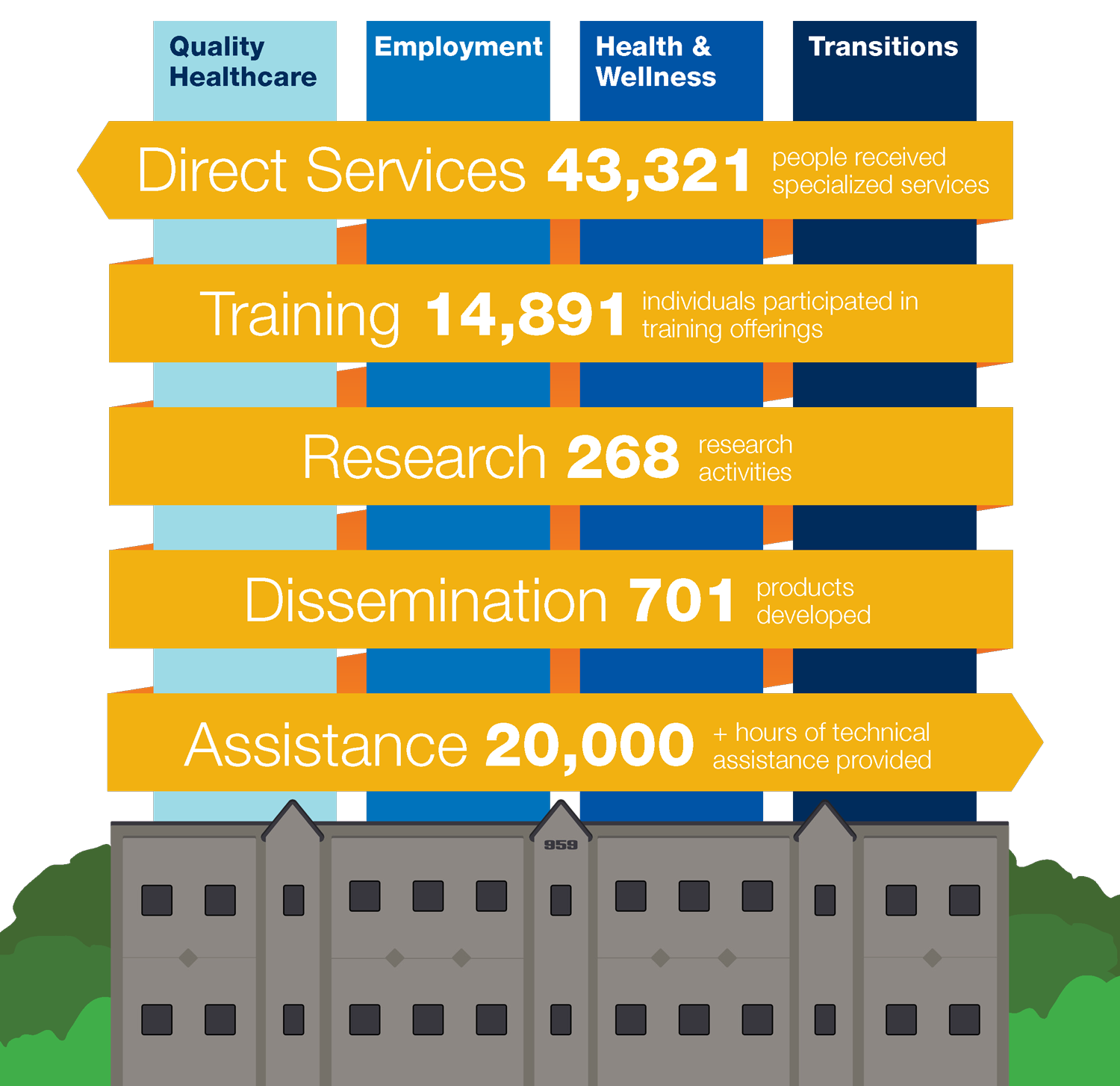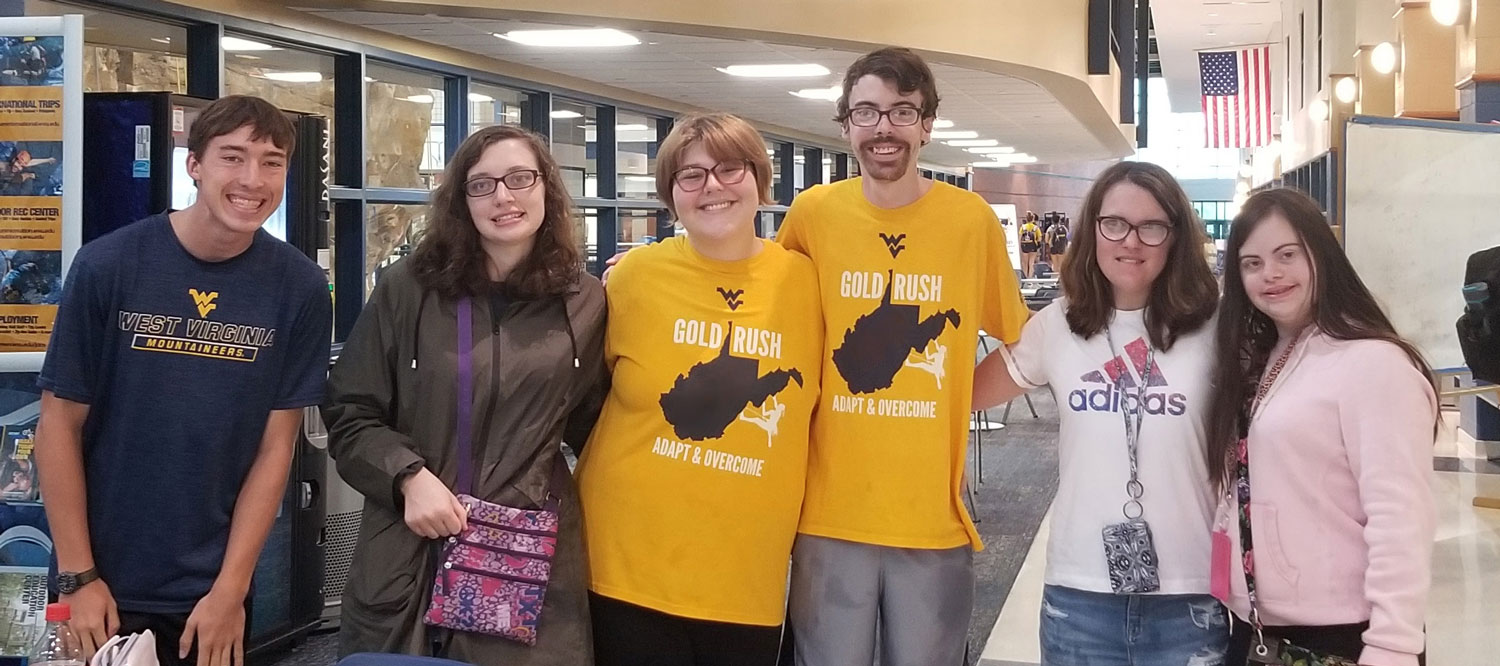This report reflects the progress of the WVU CED’s activities during its last five-year funding cycle (2018-2022) to improve health and quality of life for West Virginians with disabilities.
ABOUT the WVU CED
The WVU CED is a federally designated University Center for Excellence in Developmental Disabilities (UCEDD). We are part of a national network of similar centers across the country and serve as a resource to the community in the areas of education, research and service as it relates to the needs of people with disabilities. As a unit within West Virginia University we provide multiple services and training programs for students and professionals to make an impact through education, healthcare, leadership and advocacy.
From 2018 to 2022 the CED was composed of 8 programs, 3 clinics and 3 initiatives.
Services at the WVU CED are designed to increase the independence of all West Virginians with disabilities so they can enjoy an improved quality of life.
The WVU CED serves as a bridge between the university and the community through these core function areas:
- Providing and developing gap-filling services and supports.
- Teaching and training others to make an impact through education, healthcare, leadership and advocacy to better serve people with disabilities.
- Leading and collaborating in current research related to disability populations.
- Sharing information about disability services, supports and best practices while prioritizing accessibility and uplifting the disability community.
More than 75 employees make up the WVU CED Team.
Team members are housed at the main office in Morgantown, WV near the main campus of WVU, in Department of Health and Human Resources (DHHR) offices throughout the state, or at our new office in the southern portion of WV which moved to South Charleston in a new building. Three additional employees became the first three faculty positions within the center after being approved as the Department of Disability Services within the School of Medicine, Professional Programs. Faculty represent occupational therapy, speech pathology and audiology, biostatistics/epidemiology, pediatrics, and developmental psychology. Lastly, our center affiliates list increased by 10%, which is attributed to our efforts to increase outreach and collaborations with partners within the state.
Improving health for West Virginians with disabilities
The WVU CED focused efforts on 4 areas of emphasis: Access to Quality Healthcare, Employment, Health & Wellness, and Transitions. Activities from each core function help achieve our collective goals.

IMPACTS
- 136 projects
- 302 student trainees from 14 different disciplines
- 8,811 professionals received continuing education
- Funds leveraged $37,666,091
NEWS
CED launched first college program for students with intellectual and developmental disabilities in West Virginia
High school graduates with intellectual and developmental disabilities now have an opportunity to join West Virginia University’s campus through the new Country Roads program developed to prepare them for independence by providing improved academic, social and real-world work experiences.
For students who may not meet traditional entrance requirements for college, a program like Country Roads can build a bridge of support which allows them to gain the academic and independent living skills and confidence they need to be successful.
The program includes a two-year core track focused on independent living skills, social engagement, leadership, and workforce preparedness. At the end of the program, students may enroll at WVU or decide to go into the workforce with a stronger resume and a better understanding of their interests and skills.

“Exposure to opportunities like these are some of the most valuable aspects of my education in the medical field and will help shape me into a better and more adaptable provider.”
– WVU Physician Assistant Student
New CED program supports co-existing mental health and disability populations
Research has shown that individuals with disabilities experience frequent mental distress almost five times as often as individuals without disabilities. Research by the CED’s Positive Behavior Support program showed that people with intellectual and developmental disabilities receive less/lower quality mental health services than the rest of the population in West Virginia. As a result, the CED now offers mental health services to individuals with disabilities, their families and the providers who serve them. In addition to the counseling offered, the CED’s mental health specialist also trains counseling students at WVU to better work with those in the disability population.
Contact cedcontact@hsc.wvu.edu with questions or for more information.
CED launched international training curriculum to support engagement and child development for families impacted by substance use disorder

The CED is now offering an international training curriculum to support West Virginia families in recovery and their children who have experienced prenatal exposure.
The Brazelton Touchpoints Center Learning Network certified the CED as a new training site with faculty from the WVU Rockefeller Neuroscience Department of Behavioral Medicine and Psychiatry and the WVU School of Nursing.
Brazelton Touchpoints is an evidence-based approach to building strengths-based, collaborative family-provider partnerships in service of strong, healthy family-child relationships from before birth throughout early childhood. The Brazelton Touchpoints Center has collaborated with the IMPACT WV program at the CED to make training opportunities like this one available to the state’s community of family-facing providers.
Contact wvimpact@hsc.wvu.edu for more information or if you have questions.
“Being able to work in an interprofessional setting has positively affected how I learn in other classes. I have been able to see how different professions would approach things.”
– WVU Speech Language Pathology Student
New grants expanded assistive technology opportunities

The CED’s West Virginia Assistive Technology System (WVATS) received two grants from the Christopher and Dana Reeve Foundation to expand opportunities for individuals with disabilities to receive adapted equipment for independence that may not be covered by their medical insurance.
The Pay it Forward WV project provides long-term loans of pediatric equipment to qualifying families in WV. These are therapeutic and recreation items that need to be replaced as children grow. Most of these items are not funded by WV Medicaid or private insurance. Many families do not have access to these items due to the cost.
The Adventure is for Everyone project is increasing ways for individuals with spinal cord injuries and other mobility impairments to participate in outdoor sports by hand cycling. WVATS partnered with Wamsley Cycles in Morgantown and the Challenged Athletes of WV at Snowshoe Mountain Resort in Snowshoe, West Virginia, to house the new accessible bikes and make them available for people to borrow. By housing the bikes with places that offer traditional and adapted bikes in one location, friends and families can have an inclusive recreation experience.
Contact wvats@hsc.wvu.edu with questions or for more information.

New program supports at-risk youth and young adults
The new Regional Transition Navigator Services (RTNS) program connects West Virginia’s youth and young adults ages 14-25 who are experiencing, have experienced or are at risk of experiencing serious emotional disturbance, mental illness and/or substance use disorders with needed resources. Currently, an emphasis is placed on those who are experiencing homelessness, aging out of foster care or juvenile detention, or at risk for human trafficking. Youth are connected to resources to develop independent living skills, create and cultivate natural supports, navigate resources and resource providers, access and participate in treatment and recovery services, and thrive in SAMHSA’s eight dimensions of wellness.
Contact RTN_WV@hsc.wvu.edu with questions or for more information.
